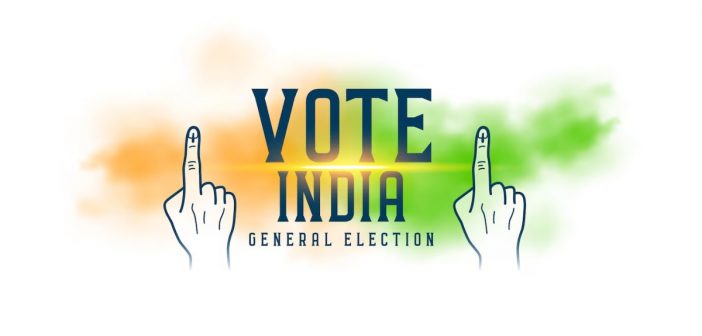The fifth phase of the Indian general elections, held on May 20, 2024, saw voters across eight states actively participating in the democratic process. Covering 49 constituencies in Bihar, Jharkhand, Maharashtra, Odisha, Uttar Pradesh, West Bengal, Jammu & Kashmir, and Ladakh, this phase was marked by high voter turnout and significant political engagement.
In Uttar Pradesh, the heartland of Indian politics, several constituencies reported record-breaking voter participation. Economic development, job creation, and local infrastructure were at the forefront of voters’ concerns, as candidates from the Bharatiya Janata Party (BJP) and the Indian National Congress (INC) campaigned vigorously. Despite minor disruptions due to technical glitches with electronic voting machines (EVMs) and sporadic violence, the Election Commission ensured a smooth voting process.
Moving to the sixth phase, which commenced on May 25, 2024, the electoral excitement continued as 57 constituencies across seven states went to the polls. This phase included key battlegrounds in Bihar, Haryana, Jharkhand, Odisha, Uttar Pradesh, West Bengal, and the crucial national capital, Delhi.
Delhi, with its seven constituencies, emerged as a critical focus area, reflecting a diverse array of voter concerns. Issues like women’s safety, air pollution, and public transportation dominated the discourse. The voter turnout in the capital was impressive, indicating strong civic engagement and a desire for impactful governance.
Voter Turnout and Participation
The fifth phase’s robust turnout underscored the electorate’s eagerness to influence the country’s direction. Uttar Pradesh and Maharashtra saw particularly high participation rates, with many first-time voters making their voices heard. Senior citizens and persons with disabilities also showed up in significant numbers, thanks to the Election Commission’s efforts to facilitate home voting for those over 85 and individuals with disabilities.
In phase six, early reports highlighted a continued high turnout. Voters in Bihar and Haryana, states with substantial rural populations, expressed their hopes for better infrastructure and economic opportunities. The urban-rural divide in voter concerns was evident, with urban areas focusing more on pollution control and job opportunities, while rural voters prioritized basic amenities and agricultural issues.
Key Issues and Campaign Highlights
Economic stability and job creation remained pivotal issues throughout both phases. The BJP, led by Prime Minister Narendra Modi, focused on its track record of economic reforms and infrastructure projects. Meanwhile, the INC, under Rahul Gandhi’s leadership, promised comprehensive economic revival plans and criticized the incumbent government’s handling of unemployment.
Infrastructure development was another significant issue, especially in rural constituencies. Voters demanded better roads, healthcare, and educational facilities. The promise of transparent governance and measures to combat corruption also resonated deeply with the electorate.
In Delhi, environmental concerns took center stage. Candidates addressed the pressing issues of air quality and water scarcity, proposing various sustainable development measures. The Aam Aadmi Party (AAP), which has a strong presence in Delhi, emphasized its initiatives in education and health sectors, aiming to retain its voter base.
Challenges and Election Management
The fifth phase faced some logistical challenges, including EVM malfunctions and isolated incidents of violence. However, the Election Commission’s swift action ensured these issues did not hinder the overall voting process. Enhanced security measures and the deployment of additional personnel in sensitive areas contributed to maintaining order.
Phase six continued to showcase the Election Commission’s effective management. With the summer heat posing a challenge, special arrangements such as extended voting hours in Telangana and provision for home voting demonstrated the commission’s commitment to an inclusive electoral process.
People’s Hopes and Aspirations
The elections have been a platform for the electorate to voice their hopes for a better future. Key expectations include:
- Economic Revival: With unemployment being a significant concern, voters are looking for concrete plans to boost job creation and economic growth.
- Infrastructure Improvement: There is a strong demand for better infrastructure, especially in rural areas, encompassing roads, healthcare, and educational facilities.
- Transparent Governance: The electorate seeks representatives committed to combating corruption and ensuring transparent governance.
- Social Harmony: Amidst rising social tensions, voters are hopeful for leaders who can promote communal harmony and peaceful coexistence.
- Environmental Sustainability: Particularly in urban areas like Delhi, there is a growing demand for solutions to environmental issues such as pollution and resource management.
As the nation moves towards the final phase of elections, the focus remains on maintaining the momentum and ensuring a smooth, fair, and peaceful conclusion to the process. The results, set to be announced on June 4, 2024, will determine the future trajectory of India’s socio-economic landscape, reflecting the collective will of its diverse electorate.




